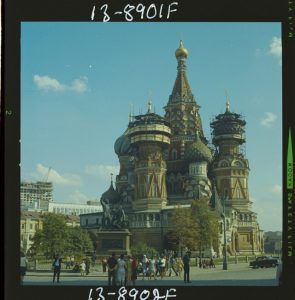By Casey Alexander
The tour guide marched them into the gift shop for the third time in an hour. Pen and pencil sets, car covers, and inflatable wading pools bore the logo of The College of Alfred and Larry. Ashley’s father bought her a thermos; she wondered what it would be like to enjoy hot and cold drinks in this place.
“Let’s make our way to the founders’ statue,” the guide said, waving the group toward the exit. She was a rising senior named Lauren who loved the weekends and understood that everything was better with stickers. Before the statue of two morose-looking men, she explained that Alfred and Larry were two farm boys with a vacant barn and a dream. They’d established the college in 1975, later annexing a defunct summer camp which they turned into additional housing. Ashley recognized the low wooden buildings and vast green expanses from the pictures she’d seen online. The campus was in Wheelbarrow, Vermont—only a six-hour drive, the brochure noted proudly, from vibrant Montpelier.
Four families took in the silence. It was June, so there were no students; on the upside, there was warm, dry land underfoot. The water flowed in the duck pond. (The admissions office aimed for these emerald days when anyone wanted to visit.) A boy asked when the winter usually started; Lauren pointed out how breathable and chic long underwear was these days. She led them past the modest academic building and up the hill toward the Center for Recreation and Leisure. In addition to the roller rink and concert pavilion, she said, it contained the country’s largest collegiate arcade. “But we put our studies first,” she said, lest they think that the Alfred and Larry experience consisted of mirth alone. CAL students were serious about their pursuits; if not, they wouldn’t be where they were. “Last year,” she said gravely, “thirteen percent of applicants were rejected.”
A janitor waxed the skee ball lanes as the tour group perused the equipment. She hoped they’d be enthralled and tell friends. There were fewer plastic cups to sweep up every semester, but this was not a good sign; Alfred and Larry had fallen on hard times. The administration had gone overboard with the enticements: foosball in every dorm room, recliners in the classrooms, cutting-edge technology that was laughable junk in a year. More than anything, they were suffering from a shortage of Laurens: students with middling talents and middle-class means whose work was neither memorable nor appalling. They were good-natured, neat, unlikely to kill anybody. The office party planners of tomorrow. Either they were whacking moles and pursuing the higher mind elsewhere, or they had ceased to exist.
In its early days, the school’s marquee programs were horse grooming and funeral science, but interest in the deceased was waning, and there weren’t as many unkempt horses around as there used to be. In order to keep up with the times, they’d added majors in personal style and wellness, and changed the school motto from “Character, competence, courage” to “Celebrate your inner fantastic”. In spite of these adjustments, Alfred and Larry struggled to be anyone’s dream; the school had a certain rustic fuddy-duddy quality that was difficult to overcome.
They’d sought out other revenue streams, but the results had been mixed. The previous summer, they’d rented the campus to a Burning Man group; in all the excitement, they’d set fire to the Center for Student Life by mistake. The administration was running out of ways to cut corners; they’d laid off eight vice presidents and a horse groom, emeritus (the man had been drawing a salary on some technicality for ages). The adjuncts were living on water crackers and gruel as it was.
There were whispers of closure. The descendants of Alfred and Larry (long departed, lovingly interred by their statue) were thinking in water park terms. Whooshing water in summer, cognac and sleigh rides in winter. There would be more overhead, but less competition. Fewer public apologies.
Ashley’s father looked at the schedule; “Campus Stroll with a Student” was followed by “Coffee with a Professor”. The school’s two tenured professors were savoring coffee and rereading the newspaper elsewhere. Professor Voss had been needlessly using his middle initial for decades. He taught computer science and spent a great deal of class time discussing the Apple IIe. Professor Watson was in the Applied Linguistics department and was best known for two achievements: coining the term transdialoquialism and demonstrating that the phrase “macaroni and cheese” was more empowering than “cheese and macaroni”. At every graduation she joked that instead of retiring in the traditional sense, she preferred to be re-tired by a fresh group of students.
Lauren escorted the group to the academic building and bid them an impassioned farewell. She hoped they would become part of the CAL family, she really did; she was available if they had any questions, any at all, or just wanted to chat.
“Well,” the bald man at the front of the classroom said, barely containing a sigh. “I guess we can get started.” He introduced himself as Eric Bannon, Ph.D., and welcomed the families with as much pizzazz as he could. He made the drive to Wheelbarrow every weekend; the sessions, in conjunction with his job at the World of Waffles, kept him going between semesters. Twice he’d been observed and found wanting; the reports said “Too much angst, not enough sunshine” and “More energy in the voice.” He was to provide an upbeat overview of the academic adventure with highlights from his own courses (he taught composition but wished he could teach what he knew; not enough people appreciated the Slovenian masters these days). On good days, his Power Point presentation took up most of the time and there weren’t many questions.
Today was shaping up badly. “I was wondering what students usually read in your courses,” a woman asked when he was on slide two.
“Mostly their classmates’ writing, and their own,” he said. Here was an opportunity to hit a main taking point. “The most important thinker you’ll study at Alfred and Larry is you.”
Someone asked how many essays the students wrote in the course.
“There is one major essay,” he replied, “with extensive pre- and post-writing activities.” At one time, he explained, a teacher assigned an essay, the students wrote it, and everyone got on with their lives. However, the research showed that students were being asked to write prematurely and then not being given time to fully digest the experience. According to Purpleheimer and Squamm (2016), the ill effects of this were profound and long-lasting. For this reason, Alfred and Larry sought to ensure that students were fully prepared to cope with every stage in the process. “Because writing is a process,” he said automatically.
Composing an essay, he went on, was rather like building a house. The first step was brainstorming in function of what was required and dreamed of (he cut to a slide of himself in a poncho, ready to weather the storm; they’d told him to put more of himself into the presentations). One then had to survey the land, interview neighbors, rid the building site of all toxins. Understand how the house fit into the larger societal context. Put up scaffolding, lay the foundation, build the edifice stone by stone. Accept that it would need to be torn down again and again based on the guidance of others and rebuilt with superior skill (“Most students need six to eight drafts,” he declared; an image of a wrecking ball illustrated this point). Once the final structure was standing, the writer needed to live there—examining the roof and the walls without bias, reflecting on the emotional journey of bringing the creation to life. Which past experiences had served him, and what essential tools had he lacked? What had he learned, what had he lost, and how had his internal paradigm shifted? Most critically, where did he and the world go from here? (Eric noted that a three-day writers’ retreat provided a chance to come to terms with these questions).
“What kind of job preparation would you say that this program provides?” the woman asked, looking at him as if he were a blouse that she doubted would suit her.
“The best preparation for any job is confidence,” he said, quoting the script that the admissions office had made him learn by heart. “And that’s what we work to create.” Also, he thought, they could say that they’d been there. Employers knew that anyone lucid could learn a job as they went along, but hiring college graduates added a certain prestige, like getting Isaac Newton to shovel your driveway.
“What is this course ‘Destination Earth: Becoming a Global Citizen’ about?” Ashley’s father asked, fearing his silence might be interpreted as a lack of concern.
The thrust of it, Eric explained, was that travel was good and stereotypes were bad. Different people had different perspectives; this led them to believe different things. Once they’d assimilated these concepts, students created a diorama or musical number on the theme of world peace. Furthermore, in order to combine theory and practice, the course ended with a trip to a local Chinese restaurant.
The final question pertained to a sociology course entitled “Lens Awareness: Seeing, Being, Freeing”.
The course dealt with reckless and erroneous seeing, Eric said wearily. “Here at CAL,” he went on, “we strive to remove lenses that are cloudy, cracked, or covered with squashed bugs (metaphorically speaking, of course).” He took off his glasses to drive the point home.
He looked at the clock and asked rhetorically if anyone wanted more coffee.
***
“What do you think?” Ashley’s father said once the Maple Cake Sendoff had ended and they were back in the car.
“It could work,” she said, with the air of someone selecting a mop. She had never thought much about it. College would follow high school like the summer followed the spring. That tour guide had seemed nice; the climbing wall might be fun.
Her father watched the slim, sandy-haired girl buckle her seatbelt. It had been clear for some years that she wouldn’t bring the world to its knees. They were shooting for capable, competent, easy to get along with. Non-volatile, employed, installed in a life that was bearable most days and pleasant once in a while.
She was right; this place could work. No good alternative presented itself. There was marriage (too early) and combat (too scary); she could keep selling Jujubes at the movies, but this would be unseemly once she was fully grown. They had visited a few other schools. The one that had no grass and no grades (students received lengthy peer evaluations instead); the one whose mascot was a giant turnip with eyes. The one that had done away with all of the books and professors (students co-constructed all knowledge, drawing on TV shows that they’d seen, things that their parents had said and various dreams that they’d had). At least here there were a few adults around, and the campus seemed safe.
The financial aid officer had assured him that scholarships and loans were available; furthermore, tuition (some eighty thousand dollars a year) included an unlimited supply of starlight mints. The other schools weren’t any cheaper. What he and Ashley’s mother had saved might buy her a couple of weeks. He tried to put the numbers out of his mind.
***
The application was due on the first of October. Her transcript, two letters of recommendation, and a one-page essay on the subject of personal heroism (Alfred and Larry no longer required the SAT; in lieu of test scores, students were free to submit a video of themselves impersonating the celebrity of their choice, or an internet comment thread in which they’d played a significant role).
Her teachers had sent letters full of exclamation points and references to her smile. They highlighted punctuality, good manners (“So rare in a student her age!”), and the fine covers she put on her reports. Here was a girl who never gave up; an asset to your community without question. They recommended her without hesitation, closing with a handsome signature and a phone number that would never be called. Ashley’s guidance counselor (whom she had only met once) submitted her transcript, enclosing a note stating that she was the salt of the earth. He drew the reader’s attention to her effort and conduct scores: all ones and twos on a four-point scale, an achievement that qualified her for Commendable Honors.
Ashley decided to skip the optional stuff; there was only the essay to write. Personal heroism. She thought hard. There was that time that the toaster had started sparking and she’d unplugged it without a thought for her own welfare. The time that she’d helped the new student locate a vending machine. There was her fourth-grade class excursion to a nursing home to help the elderly make decorations for Christmas. She’d accidentally glued a paper clip to an old lady (she should probably leave out this story).
“There are times,” she began, “when a person is called on to act.” Saturday morning, the previous fall; she was manning the Friends of the Falcons information table at the soccer team bake sale. A teammate had woken up ill; in this way, fate had put her in charge of the lemonade concession at the next table as well. Things were going remarkably smoothly: the sun was shining, and every cream puff that changed hands brought the girls a step closer to long-sleeved t-shirts with their names on the back. Nevertheless, sending each customer off with a friendship flier was crucial (it listed opportunities to collaborate further: buying an ad in the yearbook and so forth). They had only made so many blondies; the proceeds from the sale might go as far as the t-shirts, but would fail to meet the team’s other needs. Most pressingly, she wrote, the end-of-season, make-your-own-sundae banquet might be in jeopardy.
She’d enjoyed the butterscotch and camaraderie in the past, she added magnanimously. “The underclassmen deserved the same fun.” As she poured a glass of lemonade for a father, disaster threatened to strike. A sudden gust of wind tore through the parking lot, ruffling the pile of fliers. Ashley watched in horror as the top two or three took flight. “Practically without thinking,” she wrote, “I ran across to the other table, lemonade in hand.” She sat the pitcher down on the stack, trapping the fliers in place.
It was only afterward that the gravity of this moment had hit her. Fun deprivation was only the tip of the iceberg: multiple catastrophes could have ensued if she had failed to step up. A hundred fliers flung about by the wind. Allowing this much litter to disgrace the school parking lot went against everything that she stood for; cleaning it up would have drained critical manpower away from the sale. Worse yet, they might have blown into traffic, mesmerizing drivers and causing a crash. A squirrel or small child might have even attempted to eat one.
In summary, in addition to being an example of valor, it was a victory for the environment, local motorists and the safety of small creatures. Her quick thinking had prevented a great deal of sorrow that day, and she hoped it was just the beginning. At the College of Alfred and Larry, she could hone her abilities and expand her horizons (“If I have the honor of being accepted,” she wrote in a parenthetical blush). “Together,” she wrote, closing on an inspirational note, “we can make the world a better place.”
***
A month later, Ashley’s father opened the door to a middle-aged woman holding a bouquet of red roses. “Mr. Wilson?” she asked with a nervous smile. “My name is Susan Canfield. I’m here to interview Ashley.” The flowers were for the girl, who accepted them with some surprise; for the parents Susan had brought an assortment of New England-themed candies (caramels in the shape of lighthouses, marshmallow churches, etc.).
Once they were alone on the sofa, Susan explained that this wasn’t an interview, really; it was a chance for them to get acquainted and see if they were a good match. Ashley took a deep breath and tried to steady her hands. (She’d decided on CAL, if they’d have her; she was also applying to Baremont, but their dorms were so musty.) She’d been going over the list of practice questions for days. Her short and long-term goals, tragedies she’d overcome with good cheer, the people and things that made her the leader she was today. The bird, fruit, landmark and building material she would compare herself to, or choose to be given the chance. These topics were in section one; she hadn’t gotten all the way through section two (“What is the nature of God? Compare and contrast black holes and the Iran-Contra Affair. What distinguishes you from the plebes?”) but her guidance counselor said that this part was mostly for tier one schools—the kind that crushed a hundred hopefuls for every gem they admitted.
“What would you like me to tell the admissions committee about you?”
This question was not on the list. Ashley took two separate sips from her water glass to buy time. She tried to be a nice person. She always completed her homework. She’d never run over anything in the family car.
“That’s excellent,” Susan said, writing something on a notepad. “Now,” she said, “what would you like to know about the College of Alfred and Larry?” She was prepared to accentuate the school’s charms as instructed. The director of admissions had written her a letter in May. Would she lend a hand in this uncertain moment? Donations were always welcome, but help with recruitment could make an even bigger impact. In order to make the application process less arduous, alumni interviewers would visit the students at home. “Thus making it clear,” the director went on, “that CAL will meet their needs from day one.” Susan hadn’t loved the school—her most enduring memories involved snow, ice, or mud, and the green rubber boots she happily threw in a dumpster the day of her graduation—but she felt somewhat beholden to it, as she might to a wayward relative who turned up asking for bus fare.
Ashley wasn’t expecting this, either. It seemed unlikely that the woman could answer the only question she had (“Would I be happy there?”), so she asked what it was like to study at the college instead.
Susan had no idea. Her anecdotes were thirty years old, and from the look of the brochure they sent, things had changed a lot since the nineties. In those days, the college took pine and made tables: nurses, paralegals, public accountants like Susan. Now they had more of a rosewood carving mindset. The exquisite works, she heard, often came to grace the homes of the parents, whose irate letters were piling up. Twenty-five had become the new twelve: post-college life was a lot like pre-college life apart from the threatening phone calls (“If you default on your loans, you’ll be expunged from the universe,” etc.).
She began with the timeless: the marvelous friends that she’d made, the excitement of first independence, the delight of reading a book with her back against the trunk of a tree. She dredged up a few light stories–the fire drills in the night, the evening a sparrow flew into the dorm—then segued into the college’s current attractions.
“If I were there today, I’d take advantage of…” As instructed, she completed this sentence as many ways as she could. Thus described, it did sound rather inviting; for a minute, Susan was sorry she couldn’t enroll. At the end of the day, she declared, it was a place to find herself, a place to find her way. A place to embrace the unknown.
She stopped just short of belting out the school song (it only worked as a duet, and most likely the girl didn’t know it). “Maybe she would get something out it,” Susan thought. She surveyed the plush armchairs and family photos around her. “And if she ended up back here, it wouldn’t be the worst thing.”
“You’ve done exceptionally well,” she said to Ashley, who’d nodded vigorously throughout the testimonial and laughed in all the right places. The girl called her parents into the living room; Susan asked if they had any questions for her. The Wilsons’ curiosity had been exhausted; in addition to the school tour, they’d received two calls from admissions officials. They thanked her for the candies, and for coming. At the front door, she shook their hands and lowered her voice. “I want you to know that at Alfred and Larry,” she said, “your daughter will be taken care of. If you decide to trust us, she’ll never want for anything.”
Ashley admired her roses and cheered the release of a burden. Now that she’d presented her case, the matter was out of her hands. An assembly of strangers would decide what she added up to; in the meantime, she could become less conscientious at school and get the proper kick out of being a senior.
***
On the fifteenth of December, a spectacularly large envelope arrived to end the suspense.
“Dear Ms. Wilson,” the letter began. “We are extraordinarily pleased to offer you admission to the College of Alfred and Larry. This year’s selection process was more competitive than ever before, so you should be proud of your efforts. We were particularly impressed by the fact that you’re from Pennsylvania; geographic diversity is one of our community’s greatest strengths. In light of your achievements, we would like to offer you a five percent (5%) merit scholarship. Should you choose to accept, please return the enclosed form along with your non-refundable deposit by the first of the year.”
Twelve hundred students were likewise embraced; two-thirds of them sent their regrets. That evening the Wilsons went out to dinner to drink to a positive outcome and the opportunity to forget the whole thing for the moment.
***
Two years later, a bulldozer heaped earth in the vicinity of what had been the admissions building. A maple leaf-shaped pool (liquid refreshment in summer, shimmering ice in the winter) would be the centerpiece of the Alfred and Larry Resort. The water park idea had been scrapped; there were too few children nearby and too many potential disasters. It was more cost-effective to build a resort for urban couples who found desolation romantic. Apart from the swimming pool, this had required surprisingly few alterations: primarily, they took out the bunkbeds, added decorative pillows and nailed wooden beams to the ceilings.
Alfred and Larry’s statue stood resolute in the midst of the chaos. A banner was draped across the men’s shoulders: “Thanks for the memories,” it read. (The statue, along with Alfred and Larry themselves, were slated for removal once the work was completed. They were keeping the name in tribute to the two men, but this dreary reminder was a bridge too far).
Baremont had agreed to absorb the bewildered CAL students. For Ashley, the move was a nuisance, but not the end of the world: her friends had accepted the transfer, and they’d fumigated the dorms. She hadn’t yet chosen a major, but things would fall into place. Solvency, passion, and the proper companions would find her; it was only a matter of time.
Casey Alexander is an American English professor and translator living in Barcelona, Spain. She has a BS from Georgetown University and an MFA from Emerson College. Her work has previously appeared in The Satirist and The Normal School.






Be First to Comment